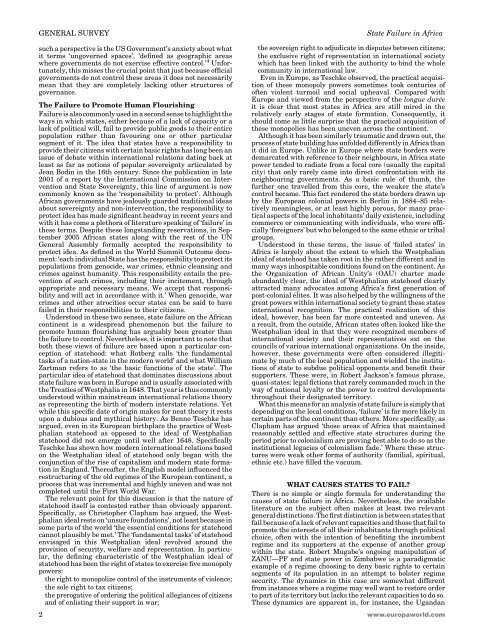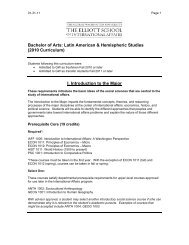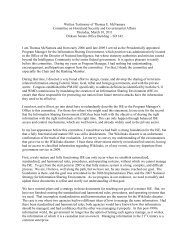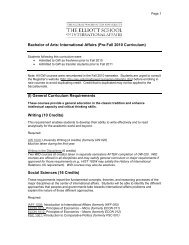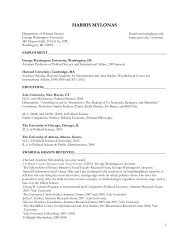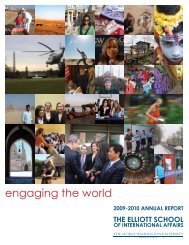state failure in africa: causes, consequences and responses
state failure in africa: causes, consequences and responses
state failure in africa: causes, consequences and responses
You also want an ePaper? Increase the reach of your titles
YUMPU automatically turns print PDFs into web optimized ePapers that Google loves.
GENERAL SURVEY State Failure <strong>in</strong> Africa<br />
such a perspective is the US Government’s anxiety about what<br />
it terms ‘ungoverned spaces’, ‘def<strong>in</strong>ed as geographic areas<br />
where governments do not exercise effective control.’ 4 Unfortunately,<br />
this misses the crucial po<strong>in</strong>t that just because official<br />
governments do not control these areas it does not necessarily<br />
mean that they are completely lack<strong>in</strong>g other structures of<br />
governance.<br />
The Failure to Promote Human Flourish<strong>in</strong>g<br />
Failure is also commonly used <strong>in</strong> a second sense to highlight the<br />
ways <strong>in</strong> which <strong>state</strong>s, either because of a lack of capacity or a<br />
lack of political will, fail to provide public goods to their entire<br />
population rather than favour<strong>in</strong>g one or other particular<br />
segment of it. The idea that <strong>state</strong>s have a responsibility to<br />
provide their citizens with certa<strong>in</strong> basic rights has long been an<br />
issue of debate with<strong>in</strong> <strong>in</strong>ternational relations dat<strong>in</strong>g back at<br />
least as far as notions of popular sovereignty articulated by<br />
Jean Bod<strong>in</strong> <strong>in</strong> the 16th century. S<strong>in</strong>ce the publication <strong>in</strong> late<br />
2001 of a report by the International Commission on Intervention<br />
<strong>and</strong> State Sovereignty, this l<strong>in</strong>e of argument is now<br />
commonly known as the ‘responsibility to protect’. Although<br />
African governments have jealously guarded traditional ideas<br />
about sovereignty <strong>and</strong> non-<strong>in</strong>tervention, the responsibility to<br />
protect idea has made significant headway <strong>in</strong> recent years <strong>and</strong><br />
with it has come a plethora of literature speak<strong>in</strong>g of ‘<strong>failure</strong>’ <strong>in</strong><br />
these terms. Despite these longst<strong>and</strong><strong>in</strong>g reservations, <strong>in</strong> September<br />
2005 African <strong>state</strong>s along with the rest of the UN<br />
General Assembly formally accepted the responsibility to<br />
protect idea. As def<strong>in</strong>ed <strong>in</strong> the World Summit Outcome document:<br />
‘each <strong>in</strong>dividual State has the responsibility to protect its<br />
populations from genocide, war crimes, ethnic cleans<strong>in</strong>g <strong>and</strong><br />
crimes aga<strong>in</strong>st humanity. This responsibility entails the prevention<br />
of such crimes, <strong>in</strong>clud<strong>in</strong>g their <strong>in</strong>citement, through<br />
appropriate <strong>and</strong> necessary means. We accept that responsibility<br />
<strong>and</strong> will act <strong>in</strong> accordance with it.’ When genocide, war<br />
crimes <strong>and</strong> other atrocities occur <strong>state</strong>s can be said to have<br />
failed <strong>in</strong> their responsibilities to their citizens.<br />
Understood <strong>in</strong> these two senses, <strong>state</strong> <strong>failure</strong> on the African<br />
cont<strong>in</strong>ent is a widespread phenomenon but the <strong>failure</strong> to<br />
promote human flourish<strong>in</strong>g has arguably been greater than<br />
the <strong>failure</strong> to control. Nevertheless, it is important to note that<br />
both these views of <strong>failure</strong> are based upon a particular conception<br />
of <strong>state</strong>hood: what Rotberg calls ‘the fundamental<br />
tasks of a nation-<strong>state</strong> <strong>in</strong> the modern world’ <strong>and</strong> what William<br />
Zartman refers to as ‘the basic functions of the <strong>state</strong>’. The<br />
particular idea of <strong>state</strong>hood that dom<strong>in</strong>ates discussions about<br />
<strong>state</strong> <strong>failure</strong> was born <strong>in</strong> Europe <strong>and</strong> is usually associated with<br />
the Treaties of Westphalia <strong>in</strong> 1648. That year is thus commonly<br />
understood with<strong>in</strong> ma<strong>in</strong>stream <strong>in</strong>ternational relations theory<br />
as represent<strong>in</strong>g the birth of modern <strong>in</strong>ter<strong>state</strong> relations. Yet<br />
while this specific date of orig<strong>in</strong> makes for neat theory it rests<br />
upon a dubious <strong>and</strong> mythical history. As Benno Teschke has<br />
argued, even <strong>in</strong> its European birthplace the practice of Westphalian<br />
<strong>state</strong>hood as opposed to the ideal of Westphalian<br />
<strong>state</strong>hood did not emerge until well after 1648. Specifically<br />
Teschke has shown how modern <strong>in</strong>ternational relations based<br />
on the Westphalian ideal of <strong>state</strong>hood only began with the<br />
conjunction of the rise of capitalism <strong>and</strong> modern <strong>state</strong> formation<br />
<strong>in</strong> Engl<strong>and</strong>. Thereafter, the English model <strong>in</strong>fluenced the<br />
restructur<strong>in</strong>g of the old regimes of the European cont<strong>in</strong>ent, a<br />
process that was <strong>in</strong>cremental <strong>and</strong> highly uneven <strong>and</strong> was not<br />
completed until the First World War.<br />
The relevant po<strong>in</strong>t for this discussion is that the nature of<br />
<strong>state</strong>hood itself is contested rather than obviously apparent.<br />
Specifically, as Christopher Clapham has argued, the Westphalian<br />
ideal rests on ‘unsure foundations’, not least because <strong>in</strong><br />
some parts of the world ‘the essential conditions for <strong>state</strong>hood<br />
cannot plausibly be met.’ The ‘fundamental tasks’ of <strong>state</strong>hood<br />
envisaged <strong>in</strong> this Westphalian ideal revolved around the<br />
provision of security, welfare <strong>and</strong> representation. In particular,<br />
the def<strong>in</strong><strong>in</strong>g characteristic of the Westphalian ideal of<br />
<strong>state</strong>hood has been the right of <strong>state</strong>s to exercise five monopoly<br />
powers:<br />
the right to monopolize control of the <strong>in</strong>struments of violence;<br />
the sole right to tax citizens;<br />
the prerogative of order<strong>in</strong>g the political allegiances of citizens<br />
<strong>and</strong> of enlist<strong>in</strong>g their support <strong>in</strong> war;<br />
the sovereign right to adjudicate <strong>in</strong> disputes between citizens;<br />
the exclusive right of representation <strong>in</strong> <strong>in</strong>ternational society<br />
which has been l<strong>in</strong>ked with the authority to b<strong>in</strong>d the whole<br />
community <strong>in</strong> <strong>in</strong>ternational law.<br />
Even <strong>in</strong> Europe, as Teschke observed, the practical acquisition<br />
of these monopoly powers sometimes took centuries of<br />
often violent turmoil <strong>and</strong> social upheaval. Compared with<br />
Europe <strong>and</strong> viewed from the perspective of the longue durée<br />
it is clear that most <strong>state</strong>s <strong>in</strong> Africa are still mired <strong>in</strong> the<br />
relatively early stages of <strong>state</strong> formation. Consequently, it<br />
should come as little surprise that the practical acquisition of<br />
these monopolies has been uneven across the cont<strong>in</strong>ent.<br />
Although it has been similarly traumatic <strong>and</strong> drawn out, the<br />
process of <strong>state</strong> build<strong>in</strong>g has unfolded differently <strong>in</strong> Africa than<br />
it did <strong>in</strong> Europe. Unlike <strong>in</strong> Europe where <strong>state</strong> borders were<br />
demarcated with reference to their neighbours, <strong>in</strong> Africa <strong>state</strong><br />
power tended to radiate from a focal core (usually the capital<br />
city) that only rarely came <strong>in</strong>to direct confrontation with its<br />
neighbour<strong>in</strong>g governments. As a basic rule of thumb, the<br />
further one travelled from this core, the weaker the <strong>state</strong>’s<br />
control became. This fact rendered the <strong>state</strong> borders drawn up<br />
by the European colonial powers <strong>in</strong> Berl<strong>in</strong> <strong>in</strong> 1884–85 relatively<br />
mean<strong>in</strong>gless, or at least highly porous, for many practical<br />
aspects of the local <strong>in</strong>habitants’ daily existence, <strong>in</strong>clud<strong>in</strong>g<br />
commerce or communicat<strong>in</strong>g with <strong>in</strong>dividuals, who were officially<br />
‘foreigners’ but who belonged to the same ethnic or tribal<br />
groups.<br />
Understood <strong>in</strong> these terms, the issue of ‘failed <strong>state</strong>s’ <strong>in</strong><br />
Africa is largely about the extent to which the Westphalian<br />
ideal of <strong>state</strong>hood has taken root <strong>in</strong> the rather different <strong>and</strong> <strong>in</strong><br />
many ways <strong>in</strong>hospitable conditions found on the cont<strong>in</strong>ent. As<br />
the Organization of African Unity’s (OAU) charter made<br />
abundantly clear, the ideal of Westphalian <strong>state</strong>hood clearly<br />
attracted many advocates among Africa’s first generation of<br />
post-colonial élites. It was also helped by the will<strong>in</strong>gness of the<br />
great powers with<strong>in</strong> <strong>in</strong>ternational society to grant these <strong>state</strong>s<br />
<strong>in</strong>ternational recognition. The practical realization of this<br />
ideal, however, has been far more contested <strong>and</strong> uneven. As<br />
a result, from the outside, African <strong>state</strong>s often looked like the<br />
Westphalian ideal <strong>in</strong> that they were recognized members of<br />
<strong>in</strong>ternational society <strong>and</strong> their representatives sat on the<br />
councils of various <strong>in</strong>ternational organizations. On the <strong>in</strong>side,<br />
however, these governments were often considered illegitimate<br />
by much of the local population <strong>and</strong> wielded the <strong>in</strong>stitutions<br />
of <strong>state</strong> to subdue political opponents <strong>and</strong> benefit their<br />
supporters. These were, <strong>in</strong> Robert Jackson’s famous phrase,<br />
quasi-<strong>state</strong>s: legal fictions that rarely comm<strong>and</strong>ed much <strong>in</strong> the<br />
way of national loyalty or the power to control developments<br />
throughout their designated territory.<br />
What this means for an analysis of <strong>state</strong> <strong>failure</strong> is simply that<br />
depend<strong>in</strong>g on the local conditions, ‘<strong>failure</strong>’ is far more likely <strong>in</strong><br />
certa<strong>in</strong> parts of the cont<strong>in</strong>ent than others. More specifically, as<br />
Clapham has argued ‘those areas of Africa that ma<strong>in</strong>ta<strong>in</strong>ed<br />
reasonably settled <strong>and</strong> effective <strong>state</strong> structures dur<strong>in</strong>g the<br />
period prior to colonialism are prov<strong>in</strong>g best able to do so as the<br />
<strong>in</strong>stitutional legacies of colonialism fade.’ Where these structures<br />
were weak other forms of authority (familial, spiritual,<br />
ethnic etc.) have filled the vacuum.<br />
WHAT CAUSES STATES TO FAIL?<br />
There is no simple or s<strong>in</strong>gle formula for underst<strong>and</strong><strong>in</strong>g the<br />
<strong>causes</strong> of <strong>state</strong> <strong>failure</strong> <strong>in</strong> Africa. Nevertheless, the available<br />
literature on the subject often makes at least two relevant<br />
general dist<strong>in</strong>ctions. The first dist<strong>in</strong>ction is between <strong>state</strong>s that<br />
fail because of a lack of relevant capacities <strong>and</strong> those that fail to<br />
promote the <strong>in</strong>terests of all their <strong>in</strong>habitants through political<br />
choice, often with the <strong>in</strong>tention of benefit<strong>in</strong>g the <strong>in</strong>cumbent<br />
regime <strong>and</strong> its supporters at the expense of another group<br />
with<strong>in</strong> the <strong>state</strong>. Robert Mugabe’s ongo<strong>in</strong>g manipulation of<br />
ZANU—PF <strong>and</strong> <strong>state</strong> power <strong>in</strong> Zimbabwe is a paradigmatic<br />
example of a regime choos<strong>in</strong>g to deny basic rights to certa<strong>in</strong><br />
segments of its population <strong>in</strong> an attempt to bolster regime<br />
security. The dynamics <strong>in</strong> this case are somewhat different<br />
from <strong>in</strong>stances where a regime may well want to restore order<br />
to part of its territory but lacks the relevant capacities to do so.<br />
These dynamics are apparent <strong>in</strong>, for <strong>in</strong>stance, the Ug<strong>and</strong>an<br />
2 www.europaworld.com


